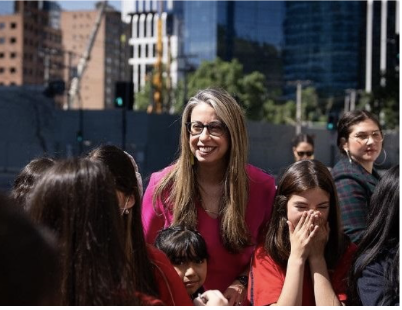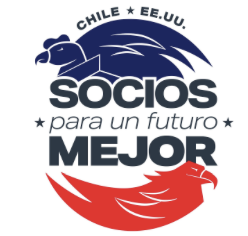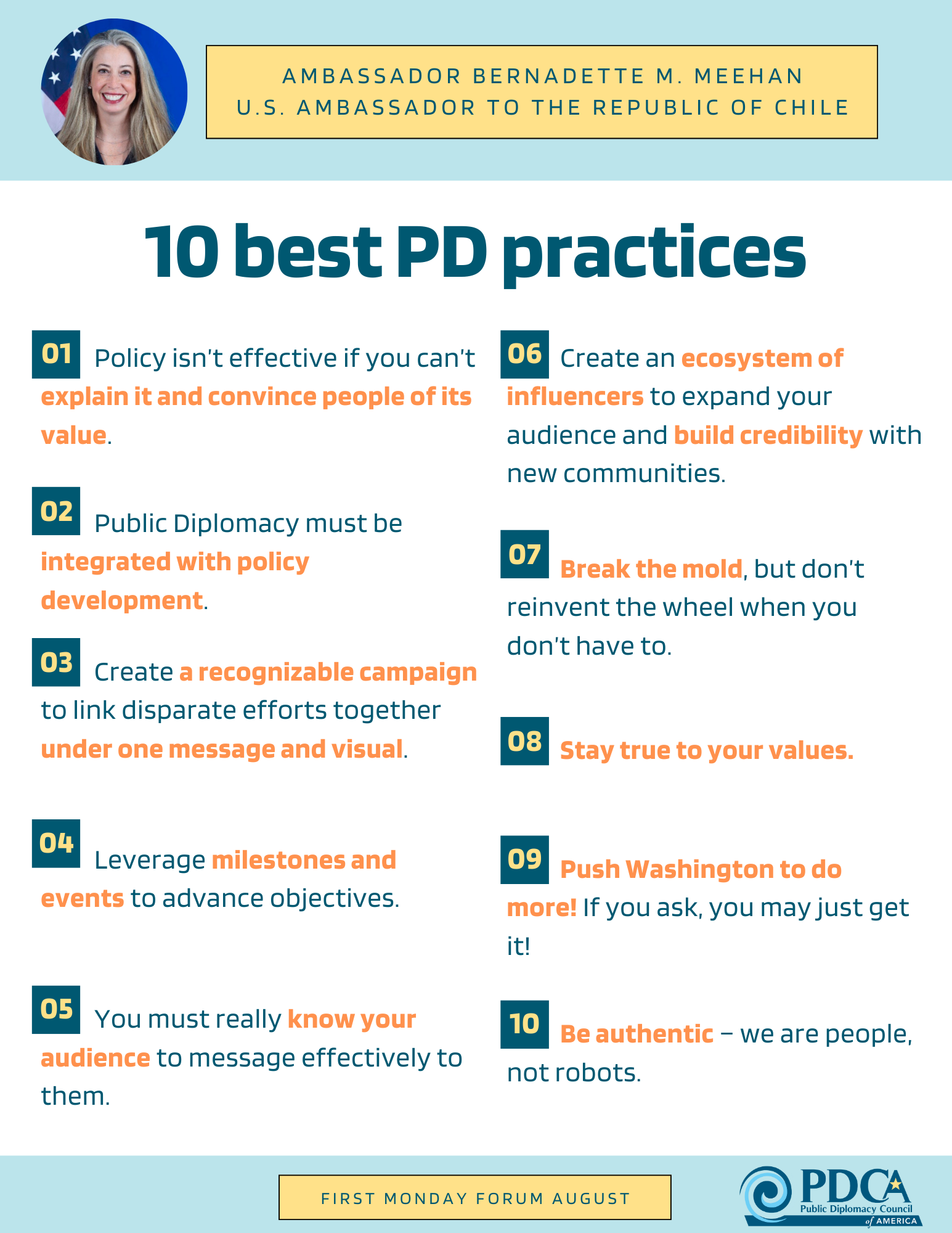Resetting Public Perceptions in Chile, by Bill Wanlund
When Bernadette Meehan sees an opportunity, she knows how to take advantage of it.
Bernadette Meehan arrived in Santiago, Chile, in September 2022 to take up the job of United States Ambassador. It was an uneasy period in the bilateral relationship: The United States had not had an ambassador there for four years, and there were doubts about America’s seriousness about Chile. Chileans had elected a left-of-center government just six months earlier, and new President Gabriel Boric had made it clear that he would take a skeptical look at his country’s dealings with the U.S., and in particular at the bilateral trade agreement [BTA] signed 20 years before which many suspected was overly generous to the Americans. Further complicating the relationship was residual bitterness over the suspected role of the United States in the 1973 military coup led by Augusto Pinochet which put democratic government in Chile on hold until 1990. This remained a source of bitter anger among many Chileans, especially the thousands whose family members were executed or otherwise “disappeared” during the harsh Pinochet regime -- while the U.S. Government, which would rather forget about the whole episode, remained virtually silent.
So Meehan was coming into a fraught situation. However, she wasn’t without resources. A fluent Spanish speaker, she was also a serious, experienced diplomat with a well-honed sense of public diplomacy -- and she had a plan. One promising anniversary had been built into her ambassadorial tenure: The U.S. and Chile would mark 200 years of diplomatic relations in 2023, which would present numerous opportunities for friendly, mutual celebration, and Meehan vowed to use that as a springboard to rebuild a strong relationship.
First, she enlisted the cooperation of every Embassy section and agency in the effort. Then, branded as a “serious, smart, experienced diplomat but accessible and down-to-earth,” she and her team set about making her vision reality. In addition to participating in the customary and necessary formalities – the official meetings and events required of every ambassador -- she and her Embassy team “developed a strategy for [her] to communicate directly with the public,” she told her First Monday Forum audience.
 “Our communications clearly explained our policy priorities, while also demonstrating my genuine personal interest in Chile, its people, and its culture,” she said. “Our postings were interactive, encouraging people to engage with me directly and create a dialogue. Thanks to the work of our incredible PD team, I became a recognized entity, and our messaging gained hundreds of thousands of views and engagements…We alternated between serious policy messaging and cultural and personal interludes. We integrated strategic traditional media engagements, including press conferences and interviews.”
“Our communications clearly explained our policy priorities, while also demonstrating my genuine personal interest in Chile, its people, and its culture,” she said. “Our postings were interactive, encouraging people to engage with me directly and create a dialogue. Thanks to the work of our incredible PD team, I became a recognized entity, and our messaging gained hundreds of thousands of views and engagements…We alternated between serious policy messaging and cultural and personal interludes. We integrated strategic traditional media engagements, including press conferences and interviews.” Centered on the theme “Partners for a better future,” with a logo designed by a young Chilean artist, the campaign emphasized the durability of the relationship “because ambassadors come and go,” Meehan said. “We radiated this theme from every aspect of our relationship – economic, political, security, military, academic, scientific, people-to-people, and more... Everything we did as an Embassy throughout the year was branded with the logo. And I mean everything: we hung an enormous banner from the Embassy’s exterior wall, we branded stationery, menus, videos, email signatures, swag, humanitarian donations, educational donations, and so on.”
Centered on the theme “Partners for a better future,” with a logo designed by a young Chilean artist, the campaign emphasized the durability of the relationship “because ambassadors come and go,” Meehan said. “We radiated this theme from every aspect of our relationship – economic, political, security, military, academic, scientific, people-to-people, and more... Everything we did as an Embassy throughout the year was branded with the logo. And I mean everything: we hung an enormous banner from the Embassy’s exterior wall, we branded stationery, menus, videos, email signatures, swag, humanitarian donations, educational donations, and so on.” Partners like the American Chamber of Commerce used the logo, as did the Government of Chile at bilateral events. The embassy secured private sector funding to allow Embassy representation at concerts, conferences and other events. Meehan takes particular pride in pointing out that President Boric – who earlier had been skeptical of the U.S. – Chile Bilateral Trade Agreement – spoke at the American Chamber of Commerce’s June 2023 gala in honor of the pact’s 20th anniversary.
By now, Meehan was ready to tackle the darker side: allegations about a U.S. role in the Pinochet coup of Sept. 11, 1973. Fifty years of official Washington silence on the affair was enough to convince many Chileans that there must be something to the allegations of American involvement. Theories ranged from actual participation of U.S. troops in Allende’s overthrow to Pinochet being the Pentagon’s hand-chosen puppet. None of this was true, but Washington’s refusal to discuss the matter at all – based largely on unwillingness to acknowledge a possible foreign policy misstep -- kept the conspiracy fires smoldering.
Ignoring State Department counsel to keep mum, Meehan ploughed ahead. She managed to convince the White House to declassify relevant portions of the CIA’s Presidential Daily Brief for the day of the coup. The documents revealed there indeed had been a U.S. hand at work – more benign than some of the rumors, but powerful in their implication: that the Embassy had been aware of a brewing military coup but did not inform the democratically-elected government of President Allende. Then, to ensure maximum opportunity for Chileans to inform themselves about the matter, Meehan obtained a grant to translate some 23,000 previously declassified documents to make them available for public review.
 Ambassador Meehan continues to lead and inspire. As seen in her ten best practices, capsulized in this chart. Moreover, she has set a standard for future aspirants to PDCA’s Senior Officer award. It’s a high bar for sure, but not impossible. You can watch her First Monday Forum remarks with inspiring video from the campaign here.
Ambassador Meehan continues to lead and inspire. As seen in her ten best practices, capsulized in this chart. Moreover, she has set a standard for future aspirants to PDCA’s Senior Officer award. It’s a high bar for sure, but not impossible. You can watch her First Monday Forum remarks with inspiring video from the campaign here.For a glimpse of Meehan's thinking, which illustrates a couple of the points in her "10 best" list, check out one of the "shorts" in our YouTube channel.